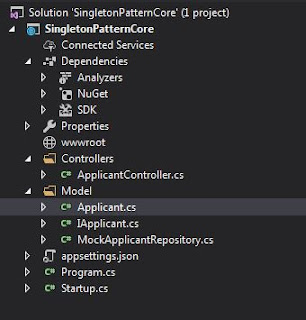The structure of project is shown as below screenshot.
Step 1: Create a class with the name 'Applicant.cs' and copy and paste the following code.
using System;
using System.Collections.Generic;
using System.Linq;
using System.Threading.Tasks;
namespace SingletonPatternCore.Model
{
public class Applicant
{
public int ApplicantId { get; set; }
public string FName { get; set; }
public string LName { get; set; }
public int Dept { get; set; }
}
}
Step 2: Create an interface with the name 'IApplicant.cs' and copy and paste the following code.
using System;
using System.Collections;
using System.Collections.Generic;
using System.Linq;
using System.Threading.Tasks;
namespace SingletonPatternCore.Model
{
public interface IApplicant
{
Applicant SaveEmployee(Applicant emp);
IEnumerable GetEmployees(int id);
IEnumerable GetAllEmployees();
}
}
Step 3: Create a class with the name 'MockApplicantRepository.cs', copy and paste the following code.
using System;
using System.Collections;
using System.Collections.Generic;
using System.Linq;
using System.Threading.Tasks;
namespace SingletonPatternCore.Model
{
public class MockApplicantRepository : IApplicant
{
private List<Applicant>
_lst;
public
MockApplicantRepository()
{
_lst = new
List<Applicant>()
{
new Applicant(){ApplicantId = 1, FName = "Ashok", LName = "Kumar", Dept = 10 },
new Applicant() { ApplicantId = 2, FName = "Mukesh", LName = "Kumar", Dept = 10 },
new Applicant() { ApplicantId = 3, FName = "Sanjay", LName = "Kumar", Dept = 10 }
};
}
public IEnumerable
GetAllEmployees()
{
return _lst;
}
public IEnumerable
GetEmployees(int id)
{
return _lst.Where(w => w.ApplicantId == id);
}
public Applicant
SaveEmployee(Applicant emp)
{
emp.ApplicantId = _lst.Max(e =>
e.ApplicantId) + 1;
_lst.Add(emp);
return emp;
}
}
}
Step 4: Create a controller with the name ApplicantController, copy and paste the following code.
using Microsoft.AspNetCore.Mvc;
using SingletonPatternCore.Model;
using System.Collections;
namespace SingletonPatternCore.Controllers
{
[Route("api/[controller]")]
[ApiController]
public class ApplicantController : ControllerBase
{
private IApplicant _emp;
public
ApplicantController(IApplicant emp)
{
_emp = emp;
}
[HttpGet]
public IEnumerable Get()
{
return _emp.GetAllEmployees();
}
[HttpPost("SaveEmployee")]
public Applicant
Post([FromBody]Applicant emp)
{
return _emp.SaveEmployee(emp);
}
[HttpGet("GetEmployeeById/{Id}")]
public IEnumerable
GetEmployeeById(int Id)
{
return _emp.GetEmployees(Id);
}
}
}
Step 5: Following code, you have to add on Startup.cs file.
using System;
using System.Collections.Generic;
using System.Linq;
using System.Threading.Tasks;
using Microsoft.AspNetCore.Builder;
using Microsoft.AspNetCore.Hosting;
using Microsoft.AspNetCore.Mvc;
using Microsoft.Extensions.Configuration;
using Microsoft.Extensions.DependencyInjection;
using Microsoft.Extensions.Logging;
using Microsoft.Extensions.Options;
using SingletonPatternCore.Model;
namespace SingletonPatternCore
{
public class Startup
{
public
Startup(IConfiguration configuration)
{
Configuration = configuration;
}
public IConfiguration
Configuration { get; }
//
This method gets called by the runtime. Use this method to add services to the
container.
public void
ConfigureServices(IServiceCollection services)
{
services.AddMvc();
//You can add AddSingleton, AddTransient and
AddScoped
services.AddSingleton<IApplicant, MockApplicantRepository>();
}
//
This method gets called by the runtime. Use this method to configure the HTTP
request pipeline.
public void
Configure(IApplicationBuilder app, IHostingEnvironment env)
{
if (env.IsDevelopment())
{
app.UseDeveloperExceptionPage();
}
app.UseMvc();
}
}
}
Following are the way to test API as shown in the screenshot.



No comments:
Post a Comment